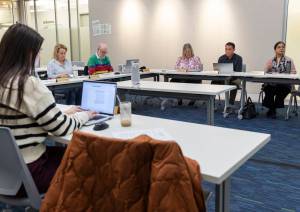Frank Kitamoto, Japanese-American community leader, dies in Seattle
Published 7:46 pm Saturday, March 22, 2014
SEATTLE — When Japanese Americans returned home after being incarcerated in internment camps during World War II, no one wanted to talk about their experiences. It was too painful. They wanted to move on.
Determined to ensure that what his community experienced would never happen again, Frank Kitamoto broke that silence.
Dr. Kitamoto, a dentist, was a leader of Bainbridge Island’s Japanese American community in Washington state, who spread awareness about Japanese internment camps, died March 15 at a Seattle hospital. He was 74.
He died of heart and kidney complications, according to his sister Lilly Kodama, of Bainbridge Island.
Frank Kitamoto was 2 ½ years old in 1942 when he, his mother and three sisters were sent to the Manzanar War Relocation Center in California after President Franklin Roosevelt signed Executive Order 9066. His father had already been rounded up by the FBI for questioning; he joined the family later.
The Japanese Americans on Bainbridge Island were the first group in Washington to be taken to the internment camps, Dr. Kitamoto said during an interview with Idaho Public Television in 2007. The Kitamoto family stayed in Manzanar for 11 months, then they were transferred to Minidoka War Relocation Center in Idaho.
Dr. Kitomoto’s earliest memories were from the camps, so, he said, he didn’t know what he was missing then. Later, he realized how difficult it must have been for the adults. He remembered spit-wad fights with other children and getting trampled at the end of the Miss Minidoka contest. When he was 5, he stole cigarettes from his dad’s dresser and smoked the whole pack, he told the television interviewer. Afterward, he was sick for a week.
“But I did give up smoking when I was 5 years old,” he said. “I remember that.”
Dr. Kitomoto was 5 when his family returned to Bainbridge Island near the end of the war. He struggled with identity, said Gerald Elfendahl, who met him in the early 1980s when they worked together on an exhibit at the Bainbridge Island Historical Museum, where Elfendahl was the curator.
“After World War II, there was such a strong social pressure for the Japanese to assimilate and not share their culture,” Elfendahl said. “He didn’t think it was good to be Japanese,” Dr. Kitomoto told him.
That changed when Dr. Kitomoto realized the public needed to hear about their experiences, Kodama said. When he tried to interview those who had been interned, some members of the community viewed him as an “angry young man who was rocking the boat,” said Clarence Moriwaki, who met Dr. Kitamoto in 1998 when Dr. Kitamoto was president of the Bainbridge Island Japanese American Community.
“There were 120,000 stories, and all their stories are different, “Moriwaki said. “Some have spent their whole time trying to forget it. Talking about it picks at that scab, and it’s painful. Frank did understand that, but he wanted to make sure that it didn’t happen again.”
Dr. Kitamoto worked with others to create an oral-history project, which he presented to students in Washington and across the nation. When Dr. Kitamoto’s exhibits and the Bainbridge Island Japanese American Exclusion Memorial were completed, the same men who initially had been opposed came forward, Kodama said.
“They told Frank they were sure glad he didn’t pay any attention to them,” Kodama said.
Dr. Kitamoto had a successful dental practice on Bainbridge Island. In his offices, there were rooms filled with heirlooms donated to him by Japanese American families. It must have driven his wife, Sharon, crazy, Moriwaki said, but she also recognized how important the items were.
“The artifacts were all over the place, and yet he felt these were important to save,” Moriwaki said. “He knew those pieces weren’t junk, they were somebody’s story.”
In addition to his sister, Lilly, survivors include Dr. Kitamoto’s wife, Sharon, and son Derek, both of Bainbridge Island, and sister Frances Ikegami of Bremerton.




